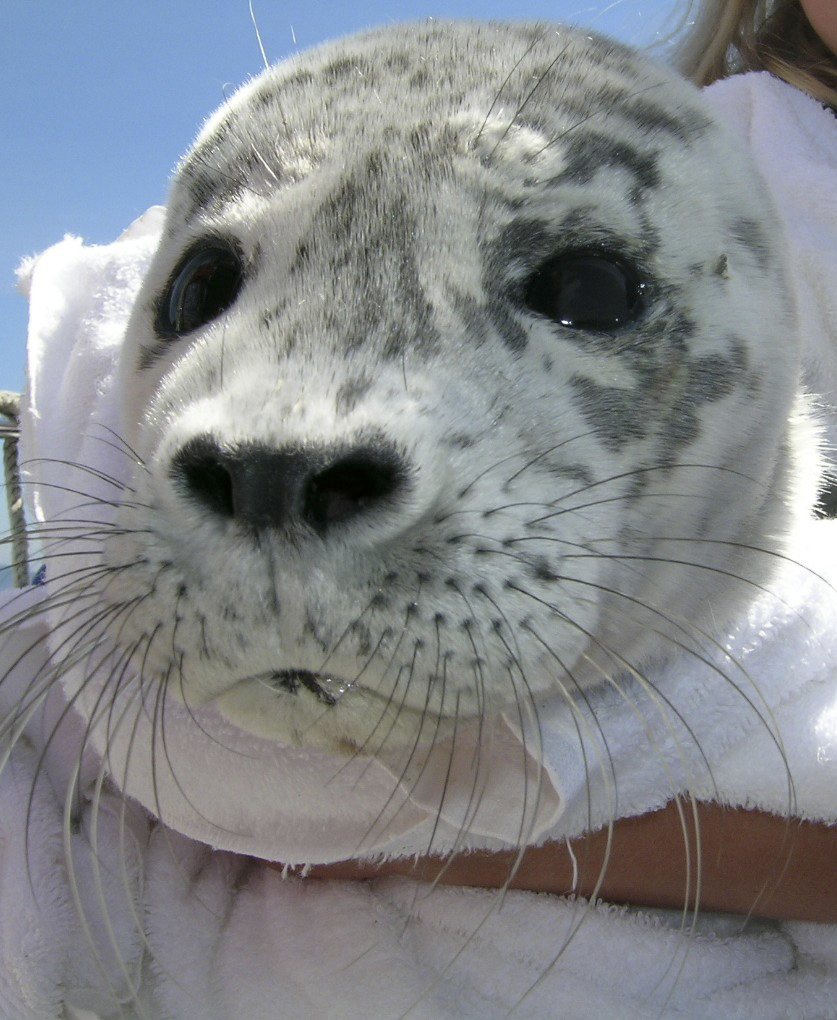by Meredith M. Griffith
Sounder contributor
When harbor seal pups get separated from their moms in Puget Sound waters, life can be brief. The official NOAA policy obeyed by the West Coast Marine Mammal Stranding Network is not to interfere.
It’s a policy that islanders living on rocky shorelines often find heartbreaking.
“We heard this crying, and it sounded almost exactly like a little baby,” said Ronna Myles-Era, who used to live on North Beach in Eastsound. “It was just awful. There was a little baby seal there on the rocks, just crying; it was obviously hungry. It even tried to follow me a little.”
She phoned Wolf Hollow Wildlife Rehabilitation Center, but was told that the harbor seal population was so high that there would be no effort to save the pup.
The week turned into a nightmare for Myles-Era and her family as the seal’s cries continued.
“Day two, day three came – no mom,” said Myles-Era. “It was visually getting skinnier.” Sorely tempted to pop the baby into her bathtub and try to feed it, she didn’t dare. The 1972 Marine Mammal Protection Act specifies civil penalties of up to $11,000 and criminal penalties of up to $100,000 and imprisonment of up to a year for “harassment, hunting, capturing, killing or collecting” marine mammals. Instead, Myles-Era and her family left the house and tried to stay away as much as possible.
“It was so awful,” she said. “I’ve never cried so much over an animal in my life.”
According to NOAA, saving pups is not a question of financial resources or human willpower. It’s just that the harbor seal population is at carrying capacity – the maximum population the environment can sustain. So the official policy is to observe, but not to interfere.
In May, a harbor seal pup made headlines when it was euthanized by Washington State wildlife officials after it was carried off a beach by a woman who thought it was abandoned.
In general, nursing harbor seal pups stay with their mothers for 4 to 6 weeks before they are weaned to forage and survive on their own.
Harbor seal pups may haul out in the same place for several days or weeks at a time, but this does not mean they are abandoned. Weaned pups will spend extended hours on shore resting and regulating their body temperature.
“Please respect nature’s role,” NOAA urges. “Up to 50 percent of the pups born will not survive their first year of life.”
San Juan Islander and Whale Museum curator Jennifer Olson is the San Juan County Marine Mammal Stranding Network coordinator.
“Federal guidelines are to stay 100 yards away, keep dogs away, keep dogs on leashes, don’t remove pups or pour water on pups,” she says. “They are resting on shore for a reason; if mom is nearby she is absolutely not going to return if there is a lot of commotion. The best chance for these guys to survive is to return to their mothers.”
While she supports the official policy, Olson admits, “It’s easy to say the population is healthy; but for us as well, it is difficult. It’s absolutely heartbreaking. They’re adorable, with their big eyes. Nature is not always pleasant.”
Olson did encourage people who see a pup alone to notify their local stranding network. “We’ve got an extensive system of volunteers. If it’s on a busy beach, we can do some education to reduce negative interaction and provide the opportunity for mom to come back if she is around.”
The only exception to the no-interference rule is if humans have affected the pup’s ability to survive. If there are signs of injuries or human harassment, the stranding network is sometimes able to step in and perform a rescue.
And in some cases, if an animal has terrible injuries and is clearly suffering, the stranding network does have veterinarians who can step in to do euthanasia.
Olson said there are about 4,000 harbor seals in San Juan Island waters, and more than 30,000 in the waters of Washington state. While separations can be caused by transient orcas, other main culprits are boaters or kayakers, she said. Olson urges islanders to spread the message to our community to make an effort to give seals their space, reducing negative interactions that can cause deadly separations.



